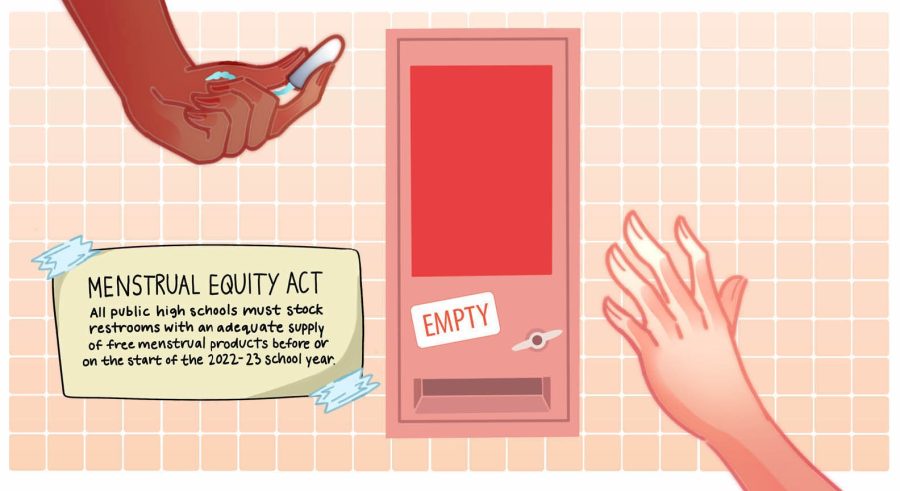Last week, administration placed notices in various Paly restrooms announcing the school would start providing free menstrual products in restrooms in compliance with California’s Menstrual Equity for All Act.
The notices, taped above baskets designed to hold the menstrual products, replaced previous blue signs that directed students to the health office, library and athletics office for products. As of last Friday, though, the baskets were empty.
The Menstrual Equity for All Act, signed into law by Gov. Gavin Newsom in Oct. 2021, requires California public secondary schools to stock “an adequate supply of free menstrual products” in all women’s and gender-neutral restrooms, as well as at least one men’s restroom. The act also says schools must ensure these products remain “available and accessible” at all times and announce their availability through a public notice before the start of the 2022–2023 school year.
But in a Schoology survey sent out by The Campanile on Aug. 23, only 10% of 170 Paly students said they could consistently access menstrual products in campus restrooms.
Admin originally took the initiative to comply with the act before it went into effect by ordering dispensers 10 months ago. And while a December 2021 Anthro Magazine article reported the implementation process to be well underway, it was delayed into the school year.
Administrators overrule student effort to supply free products
Because of the inconsistency of menstrual products in restrooms at that time, some faculty members resorted to buying products with their own money to give to students. Guidance secretary Pamela Garcia said she began doing so after noticing menstrual products were available only in inaccessible locations.
“I realized I was having more and more students ask if they were down the hall,” Garcia said. “One student mentioned she had an incident where she bled through and was embarrassed to have to walk all the way through the quad, so I just decided to keep them in stock.”
Before the Menstrual Equity for All Act was signed into law, the Associated Student Body worked on a plan to provide free menstrual products in restrooms.
In October 2021, the district took over the initiative, and when legislators passed the Act, the district’s implementation plans were already in action.
Mathew Signorello-Katz, the 2021-2022 Senior Class President, said he advocated for stocking menstrual products in restrooms before the bill was passed. However, he said when he proposed the idea of installing free menstrual product dispensers in restrooms during an ASB meeting in 2021, the ASB adviser said this was a facilities-related issue the district was better suited to handle.
“It was extraordinarily frustrating,” Signorello-Katz said. “It just goes to show how something as simple as (supplying menstrual products in restrooms) can, in a district like this, have so many implications.”
Signorello-Katz said the signing of the assembly bill in October 2021 transferred the expectation of stocking free products in restrooms from ASB to the district, but the district did not handle it as promised.
“(The district) took on the initiative of installing (dispensers) and then drew back less than a year later,” Signorello-Katz said. “Because that bill was signed, the responsibility of it could be taken off of ASB because we knew that the district would have to follow through. Which, in retrospect, seems like a rather naive way of thinking about things, hearing how things are now.”
Signorello-Katz said the district’s failure to comply with the mandate could be a result of the high rates of administrator turnover.
“The idea (of free menstrual products in restrooms) did make it to admin, and it made it to admin before (too),” Signorello-Katz said. “But one of the greater challenges with Paly is that you have constant admin turnover. Those positions can be someone’s passion project, but then they leave, and then the whole thing just resets itself and you go back to square one.”
Signorello-Katz also said the school is not prioritizing the act sufficiently.
“I find it astounding that a place like Paly that has so many resources, like multimillion dollar gym facilities and a newly built performing arts center, lacks this basic, basic product,” Signorello-Katz said. “Paly and the district need to see menstrual products as much of a necessity as soap and water and toilet paper in a bathroom.”
School delays implementation, resorts to alternative solutions
A 2021 Verde Magazine article said administrators ordered six new menstrual product dispensers for restrooms in November 2021, and an Anthro Magazine article published three weeks later quoted Assistant Principal Jerry Berkson saying the school’s supply of menstrual products would arrive soon.
But Berkson said on Aug. 24, 2022 that although he was in contact with district officials about facilities-related issues related to the act, he had not received any information following up about its implementation.
During the same interview with The Campanile, Berkson called a district employee and told them, “the law says (menstrual products) have to be available in bathrooms, but we don’t have (working) dispensers in bathrooms anymore.”
One week later, Director of Maintenance, Operations & Transportation Chuck McDonnell sent an email update to secondary school principals, secretaries and custodians about a menstrual product rollout plan. The email said the district warehouse would “order necessary product holders and send the product to school sites,” and custodians at school sites were to “restock bathrooms as they empty.”
Prior to this announcement, and after the act was passed, the custodial department made supplying menstrual products in restrooms a priority, custodian Albert Hidalgo said.
Custodians laid products out on small tables because even though menstrual product dispensers have been in Paly restrooms for nearly 50 years, they have remained virtually empty because custodians do not have the right key to stock them, Hidalgo said.
However, after the installation of signs in the restrooms at the start of the school year, which directed students to find free feminine hygiene products in the health office, library and athletics office, custodians stopped supplying products in restrooms altogether because the information implied that they were no longer supposed to.
“We thought maybe it was a turn of events where students can now get the products in a different area,” Hidalgo said. “There was no direction on whether to keep putting (the menstrual products) out.”
Health Services Coordinator Rosemarie Dowell said the district menstrual product rollout plan includes using wire baskets as a temporary solution for holding the products.
“The nursing team has been meeting with our partners in the MOT Department to discuss how we can quickly address the need to have menstrual products accessible in the restrooms,” Dowell said. “There has been a delay in getting dispensers, so we looked for alternative methods for storing.”
In a Sept. 9 email Dawn Yoshinaga, District Director of Mental Health and Wellness, said baskets were in restrooms because the current dispensers can’t hold the county-supplied menstrual products.
Absence of products in restrooms carries implications
Before The Campanile started reporting on this story, blue signs in restrooms directed students to find free feminine hygiene products in the health office, library and athletics office.
Although the district has taken steps to stock menstrual products in campus bathrooms to comply with state law, Berkson said placing products in central locations did offer an effective solution to help prevent vandalism.
“Because (the menstrual products are) free, (the signs are) a way of controlling that people aren’t just grabbing a bunch and flushing them down the toilet,” Berkson said. “It just makes sense to have them around campus in centralized locations.”
Not everyone agrees. Susan Stark, a Title IX attorney at Stanford University, said genuine access to menstrual products requires they be available in restrooms.
“You may not know you need a product until you’re actually in the restroom,” Stark said. “The point of access is in the restroom.”
Stark also said limiting access to products at school may present a Title IX violation as a form of gender discrimination.
“The point is that you want to ensure somebody’s ability to participate in educational activities,” Stark said. “Not having access on a regular basis to those products would be a violation of the act and arguably a violation of Title IX.”
Junior Bianca Landolfi, a transgender male, said placing menstrual products in alternate locations is universally inconvenient and problematic for female-to-male trans students like him who still experience periods.
“I experience a lot of (gender) dysphoria around periods,” Landolfi said. “I wasn’t sure if I would’ve needed to talk to another person or even just be seen grabbing them by another person.”
Landolfi also said a lack of discrete access to menstrual products could be dangerous for male-passing female-to-male transgender students.
“If (a trans male) passes (as) a guy, it could raise a lot of awkward questions and conversations that you really don’t want to partake in,” Landolfi said. “As well as possibly outing that person as trans.”
Neighboring schools have not had delays in complying with the Act
Though Paly has seen delays in complying with the Menstrual Equity Act, neighboring schools seem to have figured it out.
Monta Vista High School’s principal, Ben Clausnitzer, sent an email to his staff three days before school started this year, informing students that Monta Vista installed dispensers with free tampons and pads in restrooms. The dispensers have a touch-free disposal system and are in all women’s and gender-neutral restrooms as well as three men’s restrooms.
MVHS junior Taryn Lam said the Fremont Union High School District did a great job rolling out these new resources and was satisfied with the implementation was handled.
“They implemented (the dispensers) during this summer,” she said. “We left (school), and they didn’t have it, and then we came back and they had it.”
So while PAUSD continues the process of distributing menstrual products to all secondary schools, seemingly slower than other districts, Dowell said she hopes students remain positive.
She said, “We hope our student body will understand the importance and significance of the Menstrual Equity for All Act and support our efforts.”


